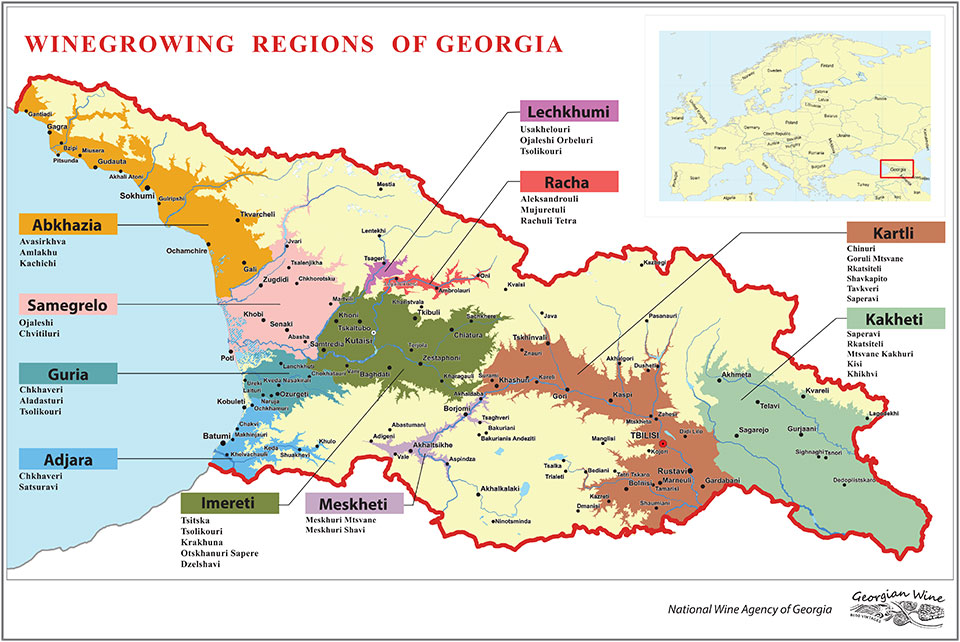We’re going to Georgia for the Merano Wine Festival Tblisi
The third edition will be held on June 2nd, 2024, in Chateau Mukhrani near capital of Georgia Tbilisi
Georgian Wine: An Ancient Tradition Looking to the Future
Georgia, nestled between the Black Sea and the Caucasus Mountains, is considered one of the cradles of global viticulture. With a history spanning over 8,000 years, this country has seen the birth and development of a unique winemaking tradition that continues to influence the contemporary enological landscape. Discover with us the historical roots of Georgian wine, the traditional production techniques, the current viticultural landscape and the local grape varieties, with particular attention to the Merano Wine Festival Georgia.
The Historical Roots of Georgian Wine
The earliest traces of viticulture in Georgia date back to the Neolithic era, with discoveries of Vitis vinifera seeds and ancient grape presses. The cultivation of vines and wine production were closely linked to the social, religious, and cultural life of ancient Georgian civilizations. Local mythology is rich with references to vines and wine, and many winemaking traditions have been passed down through generations.
One of the most fascinating discoveries has been the qvevri, large clay amphorae used for fermenting and storing wine. These amphorae, buried in the ground up to their necks, allow natural fermentation thanks to the constant temperature of the soil. The qvevri method was recognized by UNESCO as an Intangible Cultural Heritage of Humanity in 2013, underscoring its historical and cultural importance.
The Qvevri: The Heart of Georgian Winemaking Tradition
Qvevris are central to traditional Georgian winemaking. These containers, which can range in capacity from a few hundred to several thousand liters, are handmade from local clay. After fermentation, which takes place with the whole grape, including skins and seeds, the wine remains in the qvevri for several months, during which it develops a unique complexity and depth.
The use of qvevris imparts distinctive characteristics to Georgian wine: robust tannic structure, intense aromas of ripe fruit, spices, and earthy notes. This traditional method, while ancient, has been rediscovered and appreciated by winemakers and sommeliers worldwide for its ability to produce authentic wines deeply connected to the terroir.
The Merano Wine Festival Georgia: A Highlight Event
The Merano Wine Festival Georgia represents a prestigious showcase for Georgian wine on the international stage. The third edition of this event, to be held on June 2 at the Chateau Mukhrani winery near Tbilisi, is a testament to the growing interest and recognition of Georgian wines worldwide. About 60 Georgian and 10 Italian fine wine producers will be presented at the festival. The founder and CEO of the Merano Wine Festival, Helmut Koecher will be present and will introduce Italian wines. There will be some wine masterclasses, Gourmet fair and show-cooking experience.
Our CEO Alessandro Satin will be there too, to report live from the Festival on Tendervino’s LinkedIn channel, exploring new wines for the Canadian and Scandinavian markets. Many wineries have already caught our attention and are making a name for themselves globally with their excellent productions. If you are open to new (even if we should say old…), don’t miss the opportunity to follow us on Linkedin here.
This festival, arranged by the Merano Wine Festival and the Georgian Wine Association, offers a unique opportunity for producers, sommeliers, journalists, and wine enthusiasts to meet and discover the rich enological heritage of Georgia. During the event, participants will have the chance to taste a selection of the best Georgian wines, meet the producers, and deepen their knowledge of traditional winemaking techniques, such as the use of qvevris.
The Merano Wine Festival Georgia is not just a celebration of wine but also a platform for networking and cultural exchange. Conferences, seminars, and masterclasses will provide insights into the history, production techniques, and innovations in the Georgian wine sector. This event represents an unmissable opportunity for industry experts to explore in depth one of the world’s oldest winemaking traditions.
The Current Viticultural Landscape
In recent decades, Georgia has experienced a renaissance in its viticulture. After the collapse of the Soviet Union, which had monopolized and standardized wine production, Georgian winemakers rediscovered and enhanced the native grape varieties and traditional techniques. Today, Georgia boasts over 500 grape varieties, many of which are found nowhere else in the world.
Local Grape Varieties
Georgia’s ampelographic diversity is one of its greatest strengths, offering a wide range of styles and flavor profiles that reflect the country’s various viticultural microregions. Some of the most notable local grape varieties include:
- Saperavi: A red grape variety known for producing deeply colored, full-bodied wines with strong tannins and high acidity. Saperavi wines often exhibit flavors of dark berries, spices, and hints of chocolate.
- Rkatsiteli: A white grape variety that is one of the oldest known grape varieties in the world. Rkatsiteli wines are often aromatic and fresh, with notes of green apple, quince, and citrus.
- Mtsvane: Another white grape variety, Mtsvane (meaning “green” in Georgian) produces wines that are often floral and aromatic, with flavors of tropical fruit, peach, and apricot.
- Kisi: A lesser-known white variety that is gaining popularity for its versatility and ability to produce both dry and amber wines. Kisi wines typically have a complex aroma profile with hints of nuts, dried fruit, and honey.
- Aleksandrouli: A red grape variety that, along with Mujuretuli, is used to produce the semi-sweet wine Khvanchkara, known for its rich flavors of red berries, plum, and a touch of sweetness.
The Future of Georgian Wine
The future of Georgian wine looks bright, with growing interest from international markets and industry experts. Events like the Merano Wine Festival Georgia play a crucial role in promoting and valuing Georgian wines, creating a bridge between the country’s rich winemaking tradition and new market opportunities.
Additionally, enogastronomic tourism in Georgia is on the rise, attracting wine and culture enthusiasts from around the world. Georgian wineries offer authentic experiences where visitors can explore the vineyards, participate in the harvest, and witness winemaking in qvevris. This direct connection with the history and culture of Georgian wine creates a deep and lasting bond with the land.
Georgian wine represents a bridge between the past and the future, combining ancient traditions with modern viticultural practices. Historical richness, ampelographic diversity, and innovation are driving Georgia toward a prominent position in the international enological landscape. For wine experts, exploring the world of Georgian wine means immersing oneself in a millennia-old history and discovering unique wines that reflect the soul and passion of a people deeply connected to their land. The Merano Wine Festival Georgia, with its third edition, is the perfect occasion to celebrate and appreciate this extraordinary winemaking tradition.

